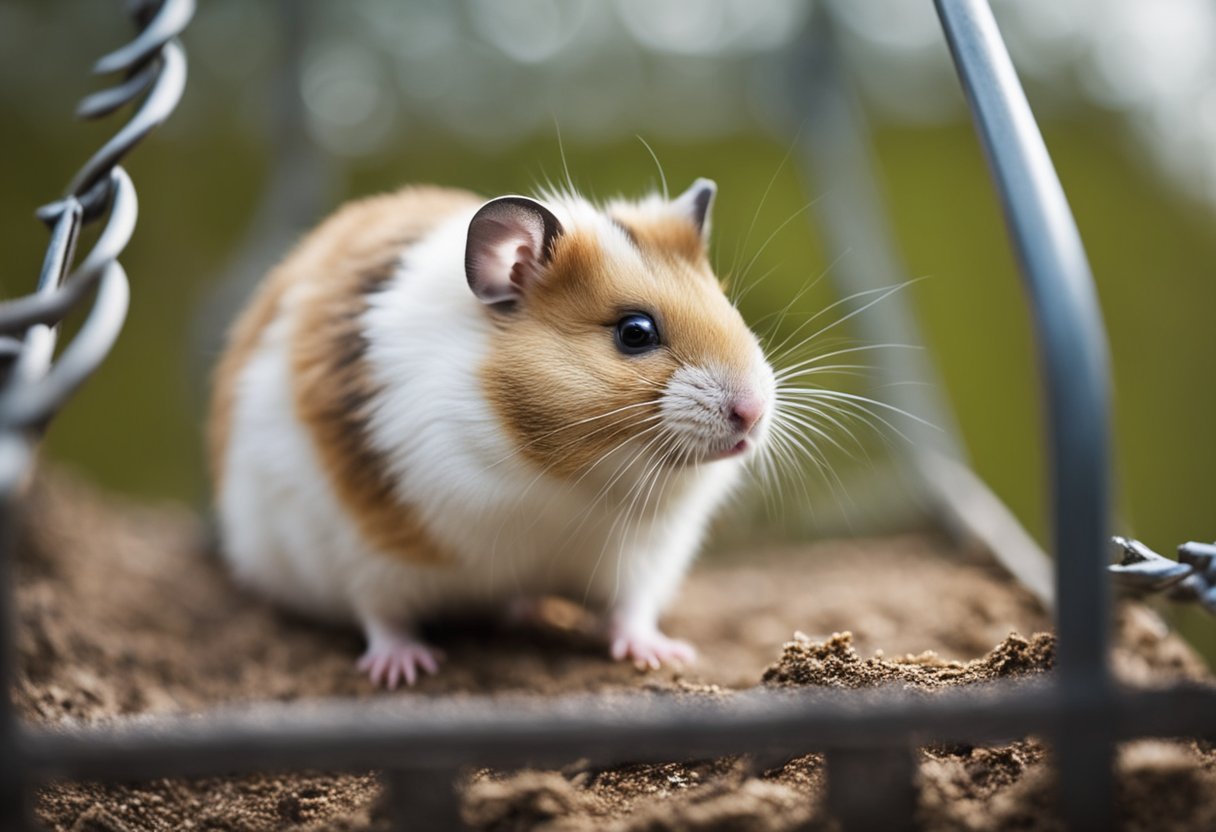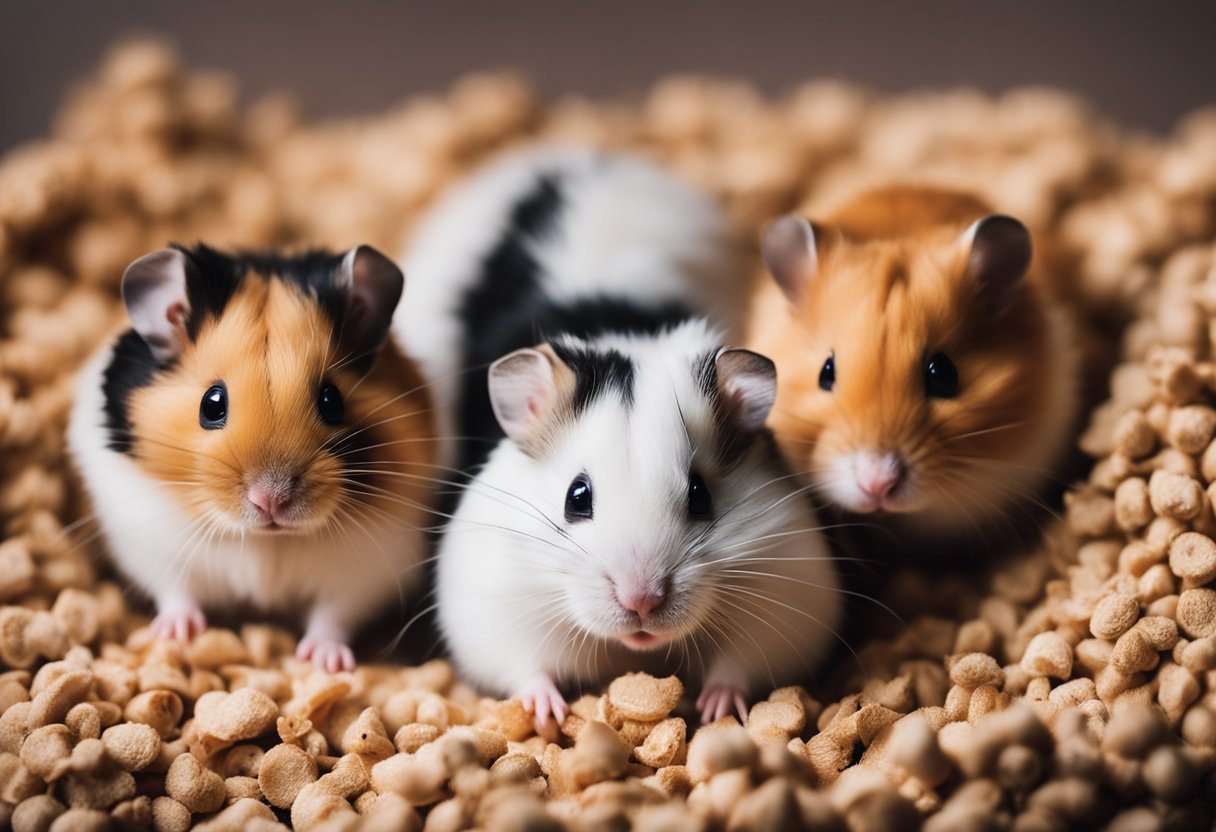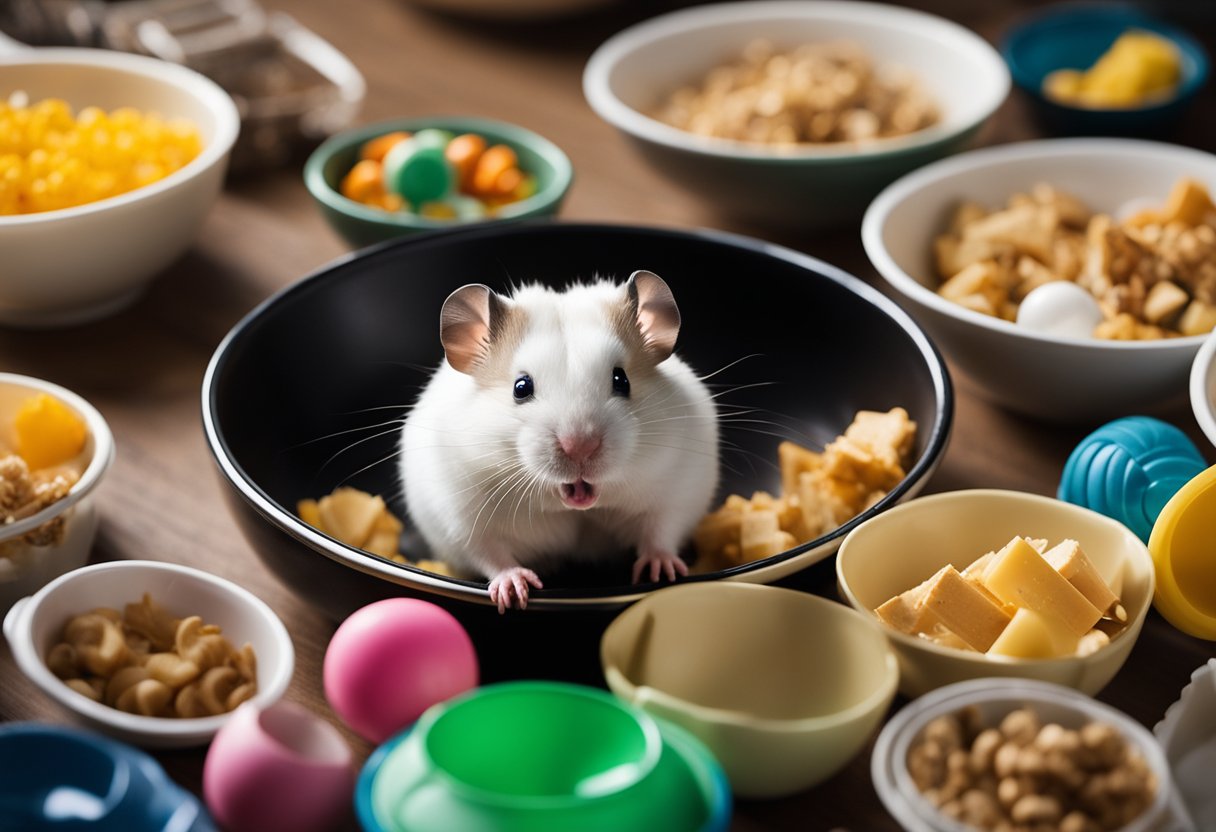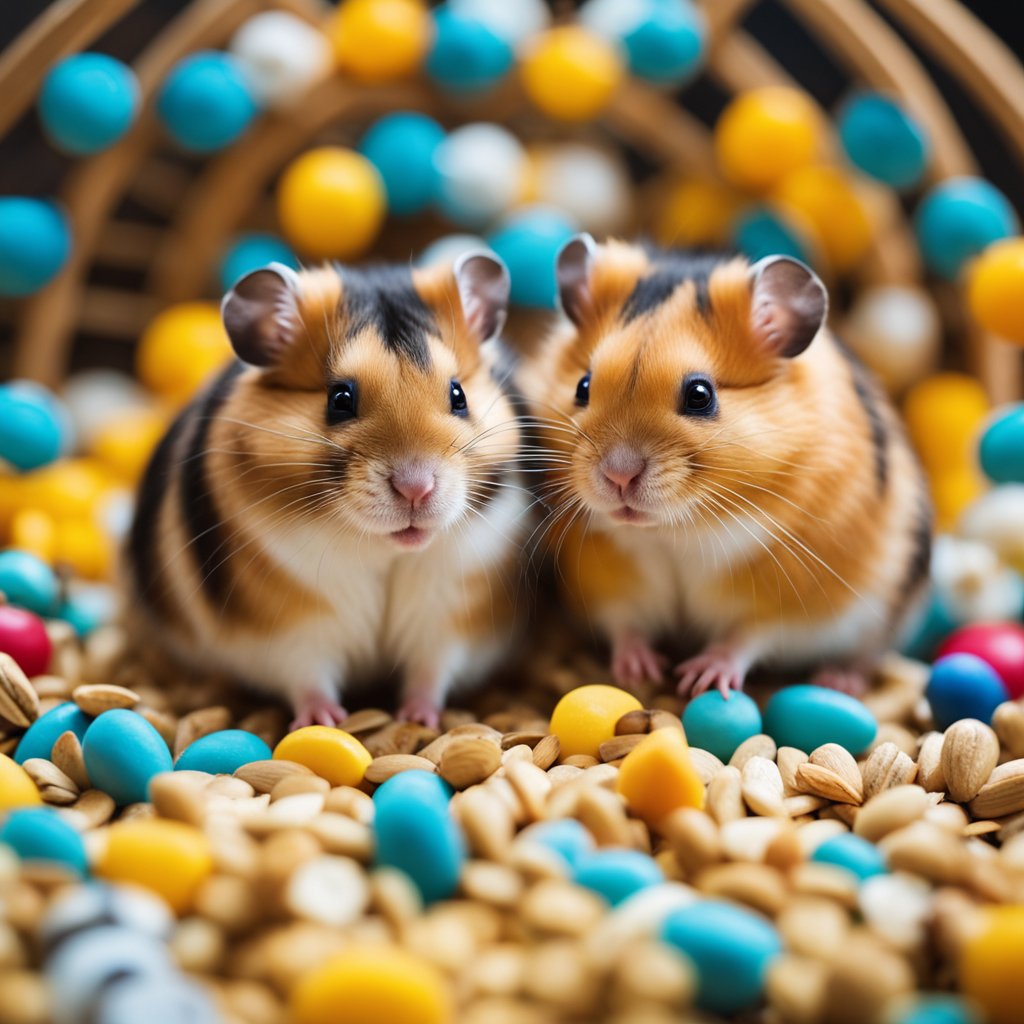What Irritates Hamsters? Common Triggers and How to Avoid Them
Hamsters are adorable and popular pets that require a lot of care and attention. They are sensitive creatures that can easily become irritated by their environment and surroundings. As a hamster owner, it’s essential to understand what irritates your furry friend to ensure they live a happy and healthy life.

Common irritants for hamsters include loud noises, bright lights, and strong smells. Hamsters have sensitive hearing and can become stressed by loud noises such as yelling, music, or construction work. Similarly, bright lights can irritate their eyes and disrupt their sleep patterns. Strong smells, such as perfumes, air fresheners, and cleaning products, can also cause respiratory problems and discomfort for hamsters.
Dietary discomforts are another common irritant for hamsters. Feeding your hamster the wrong type of food or too much of it can lead to digestive problems and discomfort. As a result, it’s crucial to provide your hamster with a balanced diet that includes fresh fruits, vegetables, and a high-quality commercial hamster food. In the following article, we will explore in more detail what irritates hamsters and how to prevent these irritants from affecting your furry friend’s health.
Key Takeaways
- Hamsters can become irritated by loud noises, bright lights, and strong smells in their environment.
- Feeding your hamster the wrong type of food or too much of it can lead to digestive problems and discomfort.
- Providing your hamster with a balanced diet and a comfortable living environment can prevent irritants and ensure their health and happiness.
Common Irritants for Hamsters

Hamsters are sensitive creatures and can easily get irritated by various factors in their environment. Here are some common irritants that you should avoid exposing your hamster to:
Improper Bedding
Using the wrong type of bedding can cause respiratory problems in hamsters. Cedar and pine shavings, for example, contain aromatic oils that can cause respiratory irritation and even liver damage. Instead, opt for bedding made of paper or aspen shavings. Clean the bedding regularly to prevent the buildup of ammonia and bacteria, which can cause respiratory issues.
Loud Noises
Hamsters have sensitive ears and can get easily startled by loud noises. Avoid placing your hamster’s cage in a noisy area or near a TV or stereo. Loud music, shouting, and even vacuum cleaners can cause stress to your hamster and make it irritable.
Sudden Movements
Hamsters are prey animals and are naturally cautious. Sudden movements can startle them and cause them to become stressed and irritable. Avoid making sudden movements around your hamster’s cage and try to move slowly and calmly when interacting with your pet.
By avoiding these common irritants, you can help keep your hamster happy and healthy. Remember to always provide your hamster with a clean and comfortable environment, and handle them gently and with care.
Dietary Discomforts

Hamsters are known for their voracious appetites, but not all foods are suitable for them. In fact, some foods can cause them discomfort and even harm. Here are some dietary discomforts you should be aware of:
Inappropriate Foods
Not all human foods are safe for hamsters. Some foods may contain ingredients that are toxic to them, while others may be difficult for them to digest. Avoid feeding your hamster the following foods:
- Chocolate: Chocolate contains theobromine, which can be toxic to hamsters and cause symptoms such as vomiting, diarrhea, and seizures.
- Citrus fruits: Citrus fruits are too acidic for hamsters and can cause digestive upset.
- Garlic and onions: These foods can cause anemia in hamsters by destroying their red blood cells.
- Avocado: Avocado contains persin, which can be toxic to hamsters and cause respiratory distress, fluid accumulation in the lungs, and even death.
Overfeeding
Overfeeding your hamster can also cause digestive discomfort. Hamsters have a tendency to hoard food, which can lead to obesity and other health problems. Here are some signs that you may be overfeeding your hamster:
- Your hamster is becoming overweight or obese.
- Your hamster is hoarding food and not eating it.
- Your hamster is experiencing digestive upset, such as diarrhea or constipation.
To avoid overfeeding your hamster, provide them with a balanced diet that is appropriate for their age and activity level. Feed them a high-quality hamster food that contains a balance of protein, fiber, and fat. Additionally, provide them with fresh fruits and vegetables in moderation, and avoid feeding them treats that are high in sugar or fat.
By being aware of these dietary discomforts, you can help ensure that your hamster stays healthy and happy.
Resources

When it comes to caring for your hamster, it’s important to have reliable resources at your disposal. Here are a few sources you can turn to for information on what irritates hamsters:
- Hamster forums: Online forums dedicated to hamster care can be a great resource for learning about common irritants for these pets. You can connect with other hamster owners and ask questions about what might be causing your hamster’s discomfort. Some popular hamster forums include Hamster Central and The Hamster Hideout Forum.
- Hamster care books: There are many books available on the topic of hamster care, and they can be a great source of information on what irritates hamsters. Look for books written by reputable authors with experience caring for hamsters. Some popular options include The Hamster Handbook and Hamsters: The Complete Guide to Keeping, Feeding and Caring for Your Hamster.
- Veterinarians: If you suspect that your hamster is experiencing discomfort or irritation, it’s important to seek the advice of a veterinarian. A vet can help diagnose the issue and provide treatment options to alleviate your hamster’s symptoms. Look for a vet with experience treating small animals like hamsters.
By utilizing these resources, you can learn more about what irritates hamsters and how to keep your pet healthy and happy. Remember to always consult with a vet if you suspect your hamster is experiencing discomfort or illness.
Conclusion

Now that you know what irritates hamsters, you can take steps to ensure that your furry friend is happy and healthy. Remember to provide a clean and hygienic environment, a balanced diet, and plenty of toys and hiding places for mental stimulation and exercise.
If you notice any signs of irritation or illness in your hamster, such as excessive scratching or hair loss, take them to the vet for treatment. It’s better to be safe than sorry when it comes to the health of your pet.
Overall, hamsters are relatively low-maintenance pets that can provide years of companionship and joy. By understanding their needs and preferences, you can create a comfortable and happy home for your hamster.
Frequently Asked Questions

What are common signs of stress in hamsters?
Hamsters can become stressed due to several reasons, such as lack of socialization, overcrowding, or changes in their living environment. Common signs of stress in hamsters include excessive grooming, loss of appetite, lethargy, and aggression towards other hamsters or humans. If you notice any of these signs, it is important to identify the cause of the stress and take steps to address it.
How can you tell if a hamster is in pain?
Hamsters are good at hiding their pain, but there are a few signs that you can look out for. These include a decrease in appetite, lethargy, hunched posture, and reluctance to move. If your hamster is exhibiting any of these symptoms, it is important to take them to a veterinarian for a check-up.
What are the typical causes of skin diseases in hamsters?
Skin diseases in hamsters can be caused by a variety of factors, such as mites, fungal infections, and allergies. Symptoms of skin diseases in hamsters include hair loss, scaly or flaky skin, and excessive grooming. If you suspect that your hamster has a skin disease, it is important to take them to a veterinarian for a diagnosis and treatment.
Are there any household items that are dangerous to hamsters?
Yes, some household items can be dangerous to hamsters. These include cleaning products, pesticides, and toxic plants. It is important to keep these items out of reach of your hamster and to make sure that their living environment is safe and free from hazards.
How can you prevent allergic reactions to hamsters?
If you or someone in your household is allergic to hamsters, there are several steps you can take to reduce the risk of an allergic reaction. These include washing your hands after handling your hamster, keeping their living environment clean, and using an air purifier to reduce allergens in the air.
What are the symptoms of a hamster nearing end of life?
As hamsters age, they may exhibit signs of aging such as decreased mobility, weight loss, and changes in behavior. If you notice any of these signs, it is important to take your hamster to a veterinarian for a check-up. In some cases, these symptoms may be indicative of a more serious health issue, and prompt medical attention may be necessary.
